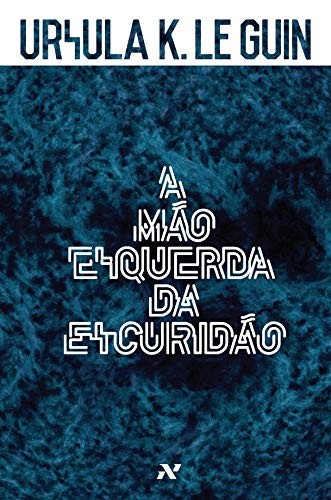Kinda like a great Star Trek episode
3 stars
An unexpected tour of a planet and it's people. Beautifully written but with an uneven plot and inconsistent characters.

Paperback
Portuguese language
Published Sept. 26, 2014 by Editora Aleph.
Comment by Kim Stanley Robinson, on The Guardian's website: The Left Hand of Darkness by Ursula K Le Guin (1969)
One of my favorite novels is The Left Hand of Darkness, by Ursula K Le Guin. For more than 40 years I've been recommending this book to people who want to try science fiction for the first time, and it still serves very well for that. One of the things I like about it is how clearly it demonstrates that science fiction can have not only the usual virtues and pleasures of the novel, but also the startling and transformative power of the thought experiment.
In this case, the thought experiment is quickly revealed: "The king was pregnant," the book tells us early on, and after that we learn more and more about this planet named Winter, stuck in an ice age, where the humans are most of the …
Comment by Kim Stanley Robinson, on The Guardian's website: The Left Hand of Darkness by Ursula K Le Guin (1969)
One of my favorite novels is The Left Hand of Darkness, by Ursula K Le Guin. For more than 40 years I've been recommending this book to people who want to try science fiction for the first time, and it still serves very well for that. One of the things I like about it is how clearly it demonstrates that science fiction can have not only the usual virtues and pleasures of the novel, but also the startling and transformative power of the thought experiment.
In this case, the thought experiment is quickly revealed: "The king was pregnant," the book tells us early on, and after that we learn more and more about this planet named Winter, stuck in an ice age, where the humans are most of the time neither male nor female, but with the potential to become either. The man from Earth investigating this situation has a lot to learn, and so do we; and we learn it in the course of a thrilling adventure story, including a great "crossing of the ice". Le Guin's language is clear and clean, and has within it both the anthropological mindset of her father Alfred Kroeber, and the poetry of stories as magical things that her mother Theodora Kroeber found in native American tales. This worldly wisdom applied to the romance of other planets, and to human nature at its deepest, is Le Guin's particular gift to us, and something science fiction will always be proud of. Try it and see – you will never think about people in quite the same way again.
An unexpected tour of a planet and it's people. Beautifully written but with an uneven plot and inconsistent characters.
Content warning It contains spoilers
After having enjoyed a lot The Dispossessed, and having read so many great reviews about this book, I cannot stop but feeling disappointed or under the impression that I failed to understand it or it was not the right time for me to read it.
I must recognize the originality of describing a whole hermaphrodite species in a forever frozen world, with their own culture and social organisation (something I enjoyed). But I felt that the story that was promised was weak, full of Deus ex machinas, unnecessary interruptions, and not even as strong and moving as I had imagined. Is the bonding between Therem and Genly as strong as suggested or is it merely survival? Are their beliefs about the other so shaken and deconstructed as suggested or were simply weak prejudices broken by the forced coexistence?
The fact that I found the narrative unconsistent and unnecessarily complex, didn't help at all. Genli's trip is littered with plenty of complex concepts that are not fully developed, (I am still unsure about what the Shifgrethor is -I had to look at Wikipedia and stack exchange), legends, explanations about calendars or chapters written from somedody else's perspective, without a clear criteria or rhythm on when those interludes are added. But probably, what I found most disappointing was the constant mentions to the how different gethenian culture, society and cosmogony are due to their hermaphroditism, but IMHO, it is never not clearly exemplified in anything specific, not to mention the missed opportunity of using they/them pronouns (albeit I'm aware that that might not be that commonplace back in 1969, and probably editors thought that books had to had male characters to be sold).
Una reflexión sobre las relaciones humanas, el género, el poder, el nacionalismo, la guerra y la política dentro de un marco de ciencia ficción, en un planeta inhóspito y frío, que invita al recogimiento. Los mensajes que deja el libro son como el frío de Invierno, se filtran hasta los huesos. Una vez lo empecé no pude parar. Cualquiera diría que es de 1969, con cuestionamientos y reflexiones muy actuales.